“Fake news”, which became a worldwide issue last year when it was spotted as the driving force of Donald Trump winning the 45th United States presidential election, has landed in Korea as well. Considering that Korea will begin its 19th presidential election before long, there are expectations that controversies surrounding fake news will become significant. Kingos should be well-acquainted with fake news since it is mainly spread through Social Network Services (SNS) such as Facebook whose main users, especially in Korea, are in their twenties. The Sungkyun Times (SKT) introduces the definition, background, and examples of fake news and the international movements against it.
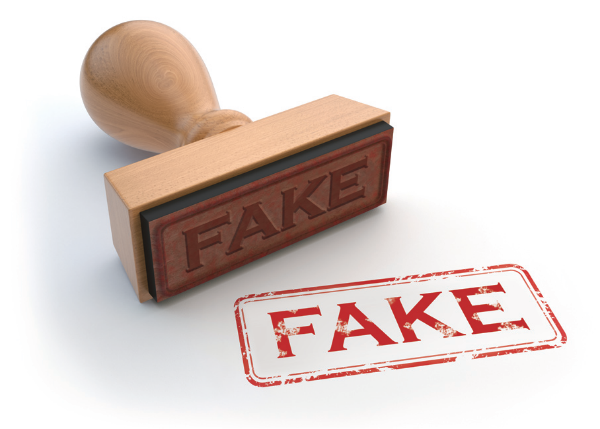
Are You Aware of Fake News?
Definition of Fake News
Unlike false or biased reports based on facts, to a certain extent, fake news is totally fabricated and made up of lies that never happened at all. They particularly mimic the format and styling of existing news organizations, so it is common for them to be found on fake websites which are not official institutions but imitations of the major news corporation.
The Oxford Dictionary selected ‘post-truth’, an environment where emotional appeals are more effective than objective facts, as the word of the year in 2016. According to Politifact, a fact-checking website, factual news is the most certain signal of post-truth society where the authenticity of an objective fact is of little importance. The biggest danger of fake news is its great ripple effect. In November 2016, an online site named Buzzfeed analyzed the number of shares, responses, and comments on 20 of the most popular fake news and real news contents on Facebook during the final three months before the U.S. presidential election. The result was surprising. Fake news received about 8.7 million responses in total, exceeding the 7.3 million of the major media outlets such as The New York Times and Washington Post.
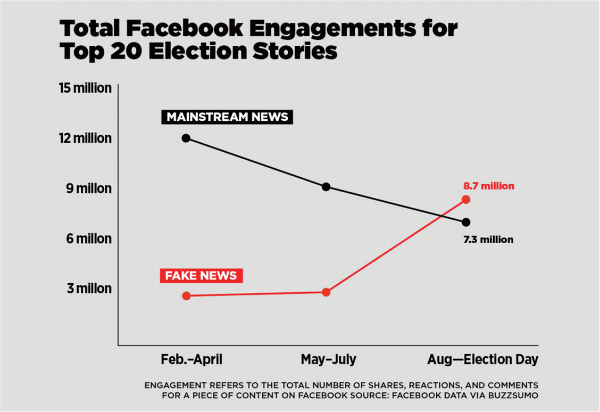
Reasons for Fake News Overflow
Generally, there are three reasons for the overflow of fake news. The first is that economic profit follows real advertisement which is uploaded with fake news. The higher the views are in an online environment or SNS, the more the advertisement profits will be, because content with higher views is connected directly to more profit-making advertisements. For example, AdSense, the advertisement connecting engine of Google, automatically assigns the most expensive advertisement on a certain webpage if it records a high number of views. Another mitigating factor of fake news is a change in the way people consume news. In the past, distribution channels such as libraries and broadcasting stations over a certain scale were necessary for spreading news. Today, however, anyone can distribute news through search engines. In particular, the introduction of “me-media” is considered as the leading cause of fake news distribution because it usually produces provocative fake news to compete with large, old existing media. Finally, there is the effect of “filter bubble”, a phenomenon in which the Internet provides customized information to users so that they can only see filtered information. Many technology-based companies such as Google, Facebook, and Twitter currently have a customized content recommendation service. When the users get information that suits their tastes, however, their stereotype and prejudice especially in social and political issues will strengthen and they will pursue biased content even more, giving power to totally wrong information. If that information gets too powerful, it will increase the fake news and could see the start of a vicious cycle.
Three Representative Cases of Fake News
Case One: the 45th United States Presidential Election
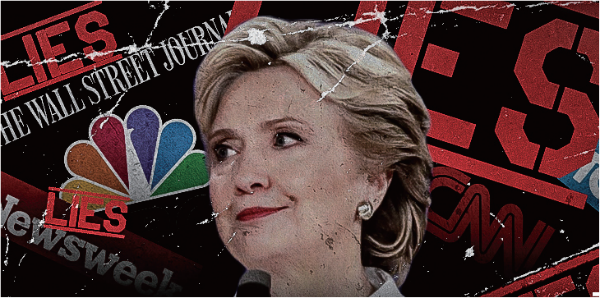
In the summer of 2016, malicious news about the Democratic Party candidate Hillary Clinton, a rival to the Republican candidate Donald Trump, swept through the social networks. For example, Universe Politics reported that Pope Francis forbade Catholics from voting for Hillary. The Political Insider also announced that WikiLeaks confirmed Hillary sold weapons to ISIS. Most of the news had no evidence to support it and the media that covered it were mostly unfamiliar ones, however, it was interesting news to certain people and they created a rapid ripple effect by sharing the stories.
Case Two: The Pakistani Minister of Defense Khawaja Muhammad Asif’s Tweet
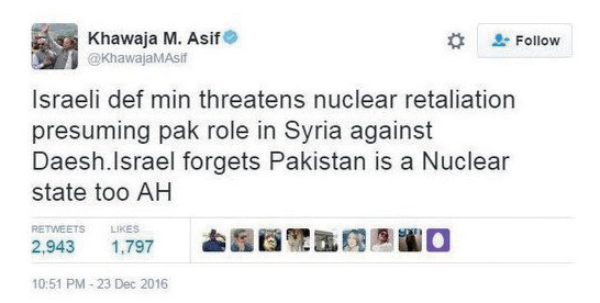
On December 24th 2016, the Pakistani minister of Defense Khawaja Mahammad Asif made a nuclear threat against Israel, tweeting “Israeli Defense Minister threatens nuclear retaliation presuming Pakistan’s role in Syria against Daesh. Israel forgets Pakistan is a Nuclear state too” on his Twitter feed. Israel immediately responded that it was not true and that they have never said that. In fact, what Asif saw was fake news uploaded to a site named AWDnews which stated that the Israeli Minister of Defense will respond with a nuclear attack if Pakistan sent troops to Syria. AWDnews, the site where it was covered, was also a fake website.
Case Three: Is Former Cuban President Fidel Castro the Biological Father of Canadian Prime Minister Justin Trudeau?
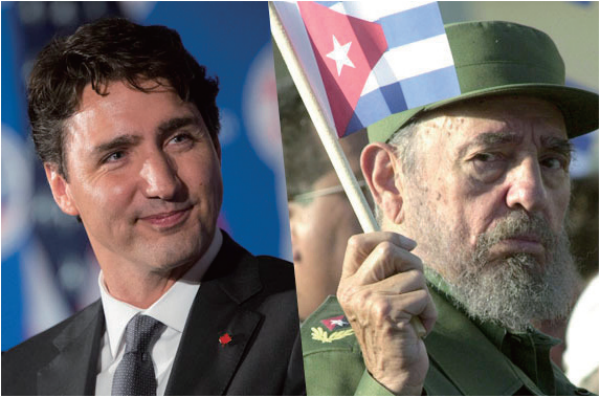
After former Cuban president Fidel Castro passed away on November 2016, an article claiming that he was the biological father of Justin Trudeau, the Prime Minister of Canada, rapidly spread throughout the online community. The rumor raised tremendous controversy among people as it was shared. Later, it was confirmed that the article was vindictive fake news written by an internet user after seeing Minister Trudeau praising Castro as a “legendary leader” while mourning his death.
Declaration of War on Fake News
Worldwide Preparation for Countermeasures
Until now, identifying the authenticity of news was only a task for readers, but today many countries around the world are preparing for countermeasures cooperating with IT companies. On November 2016, dignitaries from 11 countries gathered in Helsinki, Finland, and discussed about how to correspond on fake news. Ten countries including the United States, Germany, Sweden, and Finland agreed on establishing an international center in collaboration to deal with fake news at the meeting. Besides, websites that check whether certain content is true or false such as Factcheck, Politifact, and Snopes.com have been established and are now operating. Le Monde, one of the leading news agencies in France, also decided to found a fact-checking department and develop a database that filters out fake news.
Movements of Facebook on Blocking Fake News
On January 11th, Facebook, the epicenter of fake news, announced that it will start the ‘Facebook Journalism Project’ as an action to shut out fake news. It is also an attempt to break through the controversies surrounding the filter bubble. The project is composed of three parts: the collaborative development of news products, training and tools for journalists, and training and tools for everyone. Facebook will deepen its cooperation with its partner news organization to develop a new storytelling format and support local news. Furthermore, Facebook makes their flagging process easier for users to mark and report fake news more easily. If users flag potential fake news, a third party intervenes for an objective fact-check. Facebook asked The Poynter Institute, an authoritative institution on Journalism that has been operating a fact-checker called ‘international fact-checking code principles’ since 2016, for the fact-check. Since the project is in its first phase, big movements have not been seen so far but changes are expected in the near future.
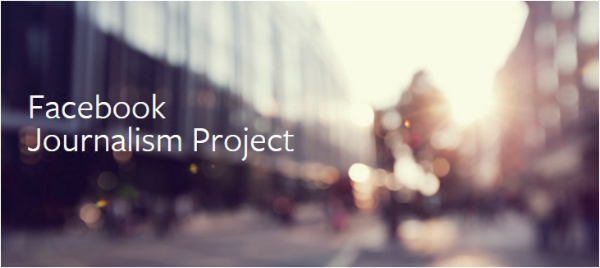
Skeptical Views on Normative War with Fake News
Because of the enormous scale and velocity of fake news production and distribution, many people still raise questions about the effectiveness of blocking fake news. Technical solutions such as filtering news based upon source writing methods and restricting accused producers are also at a restrictive level because producers of news can simply avoid them by making a detour. Some assert that reinforcing the punishment on fake news distributors is the realistic alternative because preliminary sanctions are actually impossible, while others insist that ex-post regulations have limitations since it is impossible to perfectly regulate the damage caused by the rapid spread through SNS. Therefore, a well-balanced solution that blends the preliminary and ex-post regulations is needed. Political culture in which people do not easily agree with lies aiming for political profits and education should be arranged. Social agreement on freedom of expression and distribution of fake news also should be made. Lastly, organized fact-checking systems should be established in and out of the press.
Fake News in Korea
Fake News Distribution in Korea
Unlike foreign countries where distributors aim for diverse purposes such as economic profits and political goals, most of the fake news in Korea has only political agendas. In many cases, therefore, fake news is used to slander opponents by groups with a certain political stance. Naver and Daum, the two biggest domestic news distribution channels, say that it is almost impossible for consumers to find fake news on their website since they only expose news provided by organizations that are qualified through their own news partnership evaluation committee. Experts, however, criticized that the purpose of those committees is irrelevant to regulating fake news and that fake news can easily spread due to the competition between over 600 media agencies. Moreover, since fake news is more likely to spread through SNS and the individual Internet community, the third party fact-checking process by Google and Facebook are not applicable in Korea due to the absence of the third domestic news certificate authority.
Fake News Regulations in Korea
Several established agencies such as the Korean Broadcasting System (KBS) have a fact-check system through gate keeping, a process in which decision-makers such as the editor or reporter select what to broadcast, but any new movement for fake news regulations is yet to be seen. In the past, a law that regulates the distribution of fake facts existed but it was abolished in 2015. This is because it was found to be unconstitutional after the 2010 Minerva case, an incident where Dae Sung Park who used Minerva as his nickname was arrested for distributing fake facts after he wrote articles predicting the Korean financial world, but finally was acquitted. Nowadays, it is possible to accuse the distributor of defamation and contempt only if the related person or institution complaints about damage caused by the distributed fake news. Unfortunately, it is hard to punish or accuse unless the victim is specific or they can find the first distributor which is nearly impossible.
The Move of the National Election Commission against Fake News
Since the 19th presidential election is scheduled soon, the National Election Commission decided to constitute a slander and false propaganda task force around the nation for regulating fake news. Applying the Public Official Election Act, it set a policy to imprison under seven years or sentence a fine of up to 30 million for making or distributing fake news. It will be cooperating with Facebook Korea so that it can delete illegal posts and receive related data to take action against the fake news distributors. The National Election Commission also plans to collaborate with major domestic companies such as Twitter Korea, Google Korea, Naver, and Daum KaKao.
In a world where a tremendous amount of information is accessible to us, the ability to identify the authenticity of any data is one of the most important skills that people should have. Although it is not very easy to differentiate fake news from real news due to their similarity of appearance, we should at least be aware of and be alert to it so that we do not get fooled by it. The SKT hopes Kingos will not be seduced by any circulating fake news during the upcoming presidential election.
